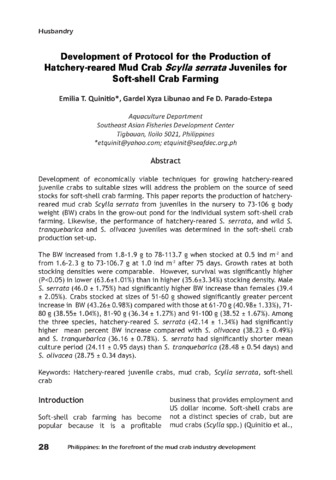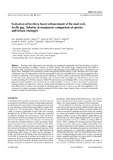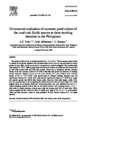| dc.contributor.author | Quinitio, Emilia T. | |
| dc.contributor.author | Estepa, Fe Dolores P. | |
| dc.date.accessioned | 2014-06-23T06:12:36Z | |
| dc.date.available | 2014-06-23T06:12:36Z | |
| dc.date.issued | 2011 | |
| dc.identifier.citation | Quinitio, E. T., & Estepa, F. D. P. (2011). Survival and growth of mud crab, Scylla serrata, juveniles subjected to removal or trimming of chelipeds. Aquaculture, 318(1-2), 229–234. | en |
| dc.identifier.issn | 0044-8486 | |
| dc.identifier.uri | http://hdl.handle.net/10862/2119 | |
| dc.description.abstract | The effects of removing or trimming the chelipeds at various molt stages on regeneration, molt interval (MI) and specific growth rate (SGR) were determined in mud crab Scylla serrata. These strategies in combination with provision of shelters and food were tested in relation to survival and growth.
Hatchery-reared S. serrata juveniles (1.3–2.2 g body weight) in the postmolt, intermolt, and premolt stages were subjected to autotomy of two chelipeds, and trimming of dactylus and pollex. Intact crabs served as the control group. Interval from stocking to first molt was significantly longer in crabs autotomized at intermolt or premolt than in trimmed or intact crabs, but was similar to intact crabs when autotomy was done at postmolt. However, MI from first to second molts was longer compared to intact crabs when chelipeds were removed or trimmed at premolt.
After the first molt, autotomy and not trimming caused significant decrease in SGR. The SGRs at the end of the test were similar to intact crabs (postmolt: 7.90 ± 0.39, intermolt: 5.64 ± 0.50) when trimming of chelipeds was done at postmolt (8.01 ± 0.75) or intermolt (4.38 ± 0.40). However, SGR was lower when premolt crabs were subjected to autotomy (4.11 ± 0.67) and trimming (5.29 ± 1.40) than when chelipeds were intact (9.45 ± 0.47).
A two-factor experiment was conducted in the second phase where intermolt crabs with autotomized or trimmed chelipeds (factor A) were either fed or starved but provided with shelters or fed but without shelters (factor B). After 10 days, higher survival was obtained in crabs with autotomized (95.55 ± 2.94%) or trimmed chelipeds (93.33 ± 3.33%) than in intact crabs (73.33 ± 6.67%). Survival was not affected by factor B, but higher final mean body weights were attained in fed crabs with (0.78 ± 0.04 g) or without shelters (0.74 ± 0.04 g) than unfed ones (0.48 ± 0.04 g). A third experiment was conducted to verify these results. Crabs with trimmed or intact chelipeds were either fed or unfed. No shelters were provided. Crabs with trimmed chelipeds (88.57 ± 0%) had higher survival than intact crabs (59.76 ± 7.56%) regardless of whether they were fed or starved; and fed crabs (0.82 ± 0.04 g) had higher mean body weight than unfed crabs (0.61 ± 0.07 g) regardless of whether chelipeds were intact or trimmed. These results indicate that trimming or total removal of chelipeds are effective strategies in reducing cannibalism. | en |
| dc.description.sponsorship | The authors thank Ms. Jennette de Pedro-Tillo for the technical assistance during the conduct of this study and to Joana Joy dela Cruz-Huervana for the preparation of figures. The study was funded by SEAFDEC/AQD. | en |
| dc.language.iso | en | en |
| dc.publisher | Elsevier | en |
| dc.subject | Decapoda | en |
| dc.subject | Scylla serrata | en |
| dc.title | Survival and growth of mud crab, Scylla serrata, juveniles subjected to removal or trimming of chelipeds | en |
| dc.type | Article | en |
| dc.citation.volume | 318 | |
| dc.citation.issue | 1-2 | |
| dc.citation.spage | 229 | |
| dc.citation.epage | 234 | |
| dc.citation.journalTitle | Aquaculture | en |
| dc.subject.asfa | autotomy | en |
| dc.subject.asfa | body weight | en |
| dc.subject.asfa | bottom culture | en |
| dc.subject.asfa | cannibalism | en |
| dc.subject.asfa | crab fisheries | en |
| dc.subject.asfa | growth rate | en |
| dc.subject.asfa | juveniles | en |
| dc.subject.asfa | shelters | en |
| dc.subject.asfa | survival | en |
| dc.subject.asfa | moulting | en |
| dc.identifier.doi | 10.1016/j.aquaculture.2011.05.034 | |
| dc.subject.scientificName | Scylla serrata | en |
| local.subject | Mud crab | en |
| local.subject | Autotomy | en |
| local.subject | Trimming | en |
| local.subject | Cannibalism | en |
| local.subject | Molt interval | en |
| local.subject | Specific growth rate | en |



